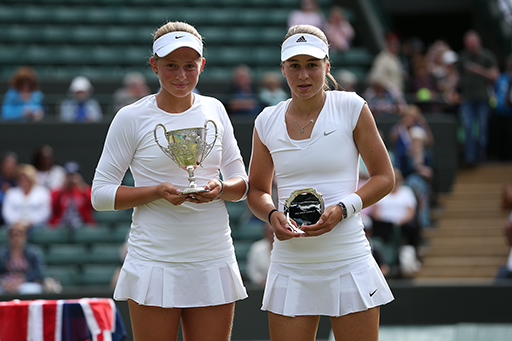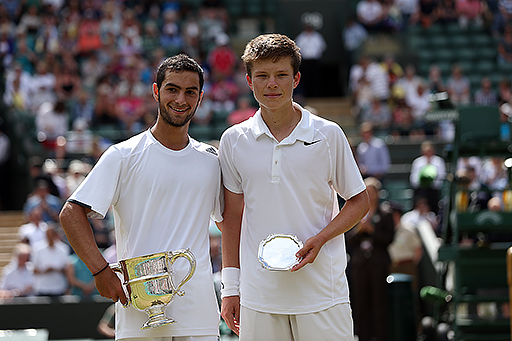JELENA OSTAPENKO iz Letonije juniorska sampionka

Exactly two years ago Eugenie Bouchard sat in the main press interview room after winning the girls’ singles. On Sunday it was the turn of Jelena Ostapenko to sit in the hot seat after recovering from a set down to triumph over No.8 seed Kristina Schmiedlova.
Like Bouchard, who is now ranked No.13 in the world and appeared in the ladies’ singles final on Saturday, the Latvian has a goal. “I think I have to maybe follow her and try to do the same,” she said. “I will try my best. I think she improved really a lot and she’s one of the best players on the tour.”
The 17-year-old overcame a shaky start to see off Kristina Schmiedlova 2-6, 6-3, 6-0 in 91 minutes in a contest played against a Centre Court chorus of claps and cheers as Roger Federer and Novak Djokovic simultaneously contested the gentlemen’s singles.
The girls had met one week earlier on the lawns of Roehampton in the final of the Nike Junior International. On that occasion, Ostapenko dropped only five games on her way to victory but she was made to work far harder on the grander stage of No.1 Court in a hard-hitting, baseline game that saw both girls pinned to the back of the court.
Her Slovakian opponent was seemingly out for revenge. Initially the sharper and faster, her booming serve was in full flow and it wasn’t long before her devastating ground strokes began to take their toll on Ostapenko who began missing easy balls.
Before long Schmiedlova had skipped to a 5-2 lead. Although she made a meal of closing out the opener – being made to defend three break points – she eventually pocketed it on her fourth set point when Ostapenko netted a forehand return.
“In the first set I was a bit nervous,” Ostapenko admitted. “My opponent, she started the match really well and she was playing really good. I was doing some unforced errors. Then I just tried to come back in the second set and focus on every point to get back my game. It helped and I won.”
Unlike Schmiedlova, who experienced a tough three-set match in the semi-finals, Ostapenko sailed through her last four encounter dropping just three games and, perhaps unsurprisingly, it was the Slovakian, sporting tape to her right upper arm, who appeared to visibly tire in the second set.
By the third set, Ostapenko was unstoppable – she whipped up 40 winners in the entire match compared with 17 from the 16-year-old – and afterwards admitted the grass was tailor-made for her game. “You have to serve well and play very aggressive,” she said.
Reflecting on her fairtytale Wimbledon, Ostapenko added: “I love everything here because I think it’s one of the best Grand Slams. The atmosphere here is really nice, the people are really nice, also the grass courts. That everyone is playing in white clothes. I think it looks really nice.”
The newly crowned girls’ singles champion, who now has nine junior titles to her name, admitted she hadn’t considered a choice of outfit for the Champions Ball.
Her now priority is ascending the ranks and quite possibly emulating the success of Canada's golden girl, Bouchard.
“Maybe, after winning junior Grand Slam, I will try to improve my ranking in the WTA and try to, in the end of the year, be maybe top 300, 200 in the WTA,” she smiled.
NOAH RUBIN juniorski sampion W


QUALIFIER NOAH RUBIN COMES FROM NOWHERE TO WIN BOYS' SINGLES
They battled for more than two hours and could barely be separated. But at the end of a classic boys’ singles final at Wimbledon on Sunday, American Noah Rubin held just a slight edge in power and composure over his compatriot Stefan Kozlov and emerged a 6-4, 4-6, 6-3 winner.
Rubin brought up match point with an aggressive winner and claimed the title when Kozlov committed an error. Such a pattern of play encapsulated the match.
Despite being the younger player by two years, Kozlov was the tournament’s No.6 seed, while Rubin – who has played just one other junior event this season, at Roland Garros – was forced to qualify simply to take his place in the main draw. Eight wins later, he is a Wimbledon champion.
“Nothing said I couldn't be here. I believe in my competitiveness, my mental capability, and speed. I don't see why not,” Rubin replied when asked about if he could envisage winning the title from the qualifying rounds.
“But I wasn't thinking ahead to this. I wasn't at all. First round quallies, playing a big server that day, I was thinking I could possibly lose the first round of qualifying. It was just point by point, match by match. Eight matches later, this is where I am.”
Rubin and Kozlov’s styles made for an extremely evenly-matched contest. Both relatively undersized counter-punching baseliners, they are slightly more potent off their forehand wings but possess rock-solid backhands. Many of the match’s early rallies were backhand-to-backhand exchanges, before one player would invariably break the deadlock by dancing around the backhand to play a forehand, or sneak in a surprise drop shot.
They traded breaks, then holds, to open the match, but Rubin, two years Kozlov’s senior at 18, broke again for a 3-2 lead and rode that advantage throughout the rest of the first set. Kozlov fought valiantly, even diving for a volley and getting the ball over the net, but Rubin was quick to meet the challenge, sliding into the shot and knifing a backhand slice past his sprawled compatriot. He took the opening set in 37 minutes, having struck more winners and fewer errors.
Kozlov broke serve early in the second set to open up a 2-0 lead, but Rubin broke back to love in the third game, celebrating vociferously. This formed part of an extraordinary run of 10 consecutive points – he actually won 12 of 13 points from the beginning of the third game. Leading by a set and a break at 3-2, the title was his for the taking.
The No.6 seed appeared deflated, yet this was deceptive. Rubin’s level dropped as the Macedonian-born Kozlov roared back into contention with a break for 3-3, courtesy of a Rubin volley error. In the 10th game, errors again hurt the elder American – he erred on consecutive backhands to hand Kozlov both the break and the set.
Both gritty competitors, nether Rubin or Kozlov appeared likely to wilt. They held serve comfortably for the first six games until some cracks appeared in Kozlov’s game. With Rubin leading 0-30, the 16-year-old would soon float a backhand long to fall behind 15-40, prompting murmurs from the large crowd on No.1 Court. Although he levelled at deuce, two more errors from Kozlov – both long of the baseline – gave Rubin the crucial break and a 4-3 lead.
“Didn't expect (the court) to be that packed. I actually thought nobody was going to come out to the match, but that was not the case. They were all very enthusiastic to be out there. Kind of got the crowd into it a little bit. Just the atmosphere was unbelievable,” Rubin later recounted.
Rubin would not let this advantage slip. He hit out bravely, drawing an error from Kozlov in the next game to hold for 5-3. In the final game, he benefited from a costly error from Kozlov, who easily tracked down a poorly-struck Rubin drop-shot only to send the reply into the net. Swinging for the fences, Rubin’s forehand winner brought up match point, and although he missed that chance with an error, he clinched victory on his second match point when Kozlov dumped a backhand into the net.
Emotions flowed as the two friends embraced at net; Rubin’s father could be seen weeping. “It was almost surreal, but hopefully it will kick in in the next couple of days,” Rubin, who embraced his father courtside, said of the victory.
“I didn't expect much coming into these tournaments. I just wanted to get out here and enjoy myself. It's one of my final junior tournaments, so it's nice to have this under my belt. I'll always remember this time.”
Kozlov’s hopes of redeeming himself in the boys’ doubles final alongside Russia’s Andrey Rublev were dashed in dramatic fashion against No.3 seeds Orlando Luz and Marcelo Zormann.
After splitting the first two sets, the third lasted almost an hour before the decisive break went the way of the Brazilian duo.
There 6-4, 3-6, 8-6 victory makes them the first Brazilian players to claim a Junior title at The Championships.